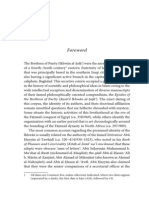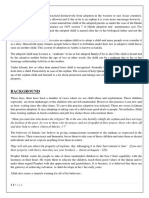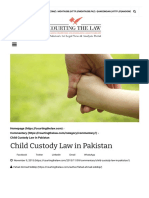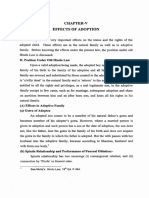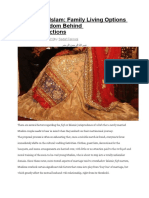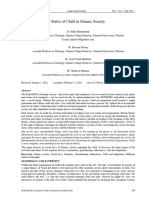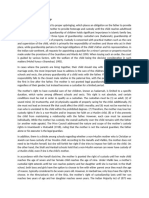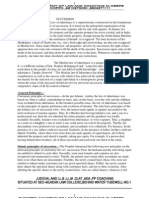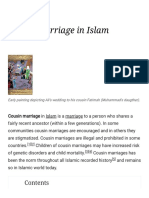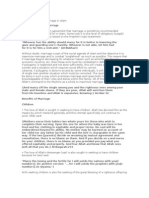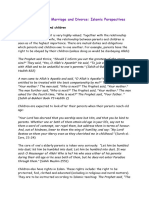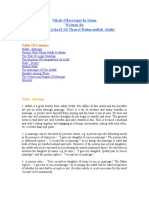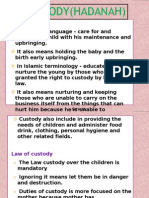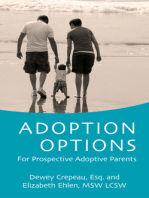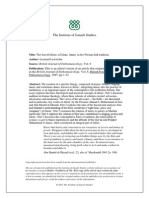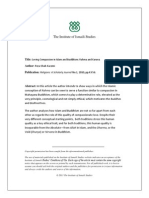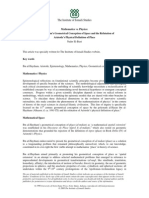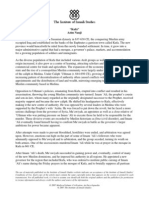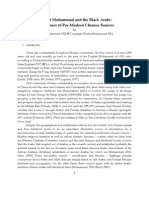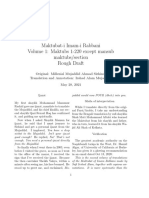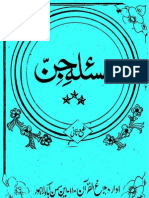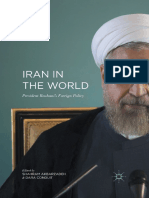Adoption in Islam
Adoption in Islam
Uploaded by
Shahid.Khan1982Copyright:
Available Formats
Adoption in Islam
Adoption in Islam
Uploaded by
Shahid.Khan1982Original Description:
Copyright
Available Formats
Share this document
Did you find this document useful?
Is this content inappropriate?
Copyright:
Available Formats
Adoption in Islam
Adoption in Islam
Uploaded by
Shahid.Khan1982Copyright:
Available Formats
Published on Books on Islam and Muslims | Al-Islam.org (http://www.al-islam.
org) Home > Adoption in Islam > To Summarize
Adoption in Islam
Log in [1] or register [2] to post comments
From the "Dear Maulana Questions" section of Shama newsletter (Vancouver, B.C., Canada) 1990 Dear Maulana: Are we allowed to adopt children? If yes, then does an adopted girl have to wear hijb when she becomes nine in front of her `father' and `brother'? Similarly, in case of an adopted boy, would the `mother' and `sister' have to observe hijb in his presence? Anonymous. Dear Anonymous: When looking at the issue of adoption from Islamic point of view, we must separate two things: first, the concept of helping orphan and poor children; second, the implications of such a help. As far as the concept of helping the poor and the orphan is concerned, Islam not only agrees to it but even highly recommends it. In all types of charities, the orphan and the poor are mentioned as the prime eligible recipients for such help. In case of the rights of the orphan children, Allh is very severe; for example, He says, Those who `swallow' the property of the orphans unjustly, are actually devouring fire into their bellies and they shall enter the burning fire. (4:10) Islam fully supports the concept of helping the orphan and poor, and taking them under your wings. If there is no one to take care of the orphan and poor children, then this responsibility falls upon the Islamic government. I wont be wrong in saying that as far as the concept of adoption is concerned, there is no difference between Islam and the West. However, when we come to the implications and legal consequences of adoption, we find some differences between Islam and the present system in the West. In the Western system, adoption does not only mean that a child is given into the care of another person or persons; it also means that the adopted child will carry the family name of the adoptive parent. For example, if a child named John Stuart Mill is adopted by Mr. William Bourassa, he will become John W. Bourassa. If this adoption took place in infancy, then most probably the child will never come to know his real genealogy or his real family name. It is this part of the adoption procedure that Islam does not accept. In pre-Islamic Arabia, the adoption system was similar to what we now see in the West: the child even takes the
family name of the adoptive father. When Islam came, it categorically rejected this procedure. An example from the life of Prophet Muhammad (s.a.w.): When the Prophet married Khadijah, she gave him a slave known as Zayd bin Hritha (Zayd, son of Hritha). The Prophet took such a good care of Zayd that their relationship changed from that of a master and a slave into one of father and son. Zayd was one of the first persons to accept Islam. When his father and uncles came to know about his whereabouts, they came to Mecca and told Prophet Muhammad that Zayd had been captured by some thieves and sold into slavery. The Prophet set him free. But Zayd refused to leave Muhammad and go home with his father. Hritha, the father of Zayd, became very angry and openly declared that from now on Zayd is not my son. The Prophet immediately responded by adopting Zayd. Zayd came to be known as Zayd bin Muhammad (Zayd, son of Muhammad). This continued till after the Prophet migrated to Medina. Zayd had grown up and was now a married man. However, his marriage did not work out. Allh revealed some verses related to Zayd's divorce in which He also talks about the issue of `re-naming' the adopted children. He says, Nor has He (Allh) made your adopted sons your sons. Such is (only) your (manner of) speech by your mouths. But God tells the truth, and He shows the way. Call them by (the names of) their fathers, that is better in the sight of God. (33:5) After the revelation of this verse, Zayd was again called Zayd bin Hritha and not Zayd bin Muhammad. However, this change in name did not affect the relationship of the Prophet and Zayd. They were still like father and son. As the Qur'n says, calling adopted children by the names of their adoptive fathers is contrary to the truth, and therefore, they must be called by the name of their real fathers.
Implications of this Verse
What this means is that adoption does not change the relationship of a person: adoption does not end the blood relationship between the child and his real parents and siblings, nor does it create a real relationship between him and his adoptive parents and their children. The practical implications of this view, on the one hand, is that all the rules which apply between blood relatives are still valid: for example, the child will still be mahram; that is an adopted child cannot marry his real siblings; he or she is also eligible for inheritance from the real parents; and there is no need for hijb between the child and his or her real family. (With the adoption system in the West, it is quite possible that a person would end up marrying his or her siblings!) On the other hand, the rules that apply between non-related persons are still valid. For example, adoption would not create the mahramiyyat between the child and the new familyan adopted girl will have to observe hijb in presence of her adoptive father and brothers; similarly, the mother and sisters will have to observe hijb in presence of the adopted son; the adopted child can even marry the child of the adoptive parents. In Islam, the right of inheritance is based on uterine relationship:
Those related by blood are more entitled to (inherit from) each other in the Book of Allah. (8:75) However, the adoptive parents can always use their discretion to write up to one-third of their estate for their adopted child.
Adoption & Foster Relationship
There is only one case of adoption where a sort of semi-familial relationship and mahramiyyat is created between the adopted child and the adoptive family: when the adopted child is below two years of age and is also breast-fed directly by the adoptive mother for at least a day and a night. This creates a foster (riz`i) relationship, and the child is mahram to the new familythere is no need for hijb, nor can the child marry the real children of the adoptive parents. However, in case of inheritance, even a riz`i child has not right in the estate of the adoptive parents. But as mentioned above, the adoptive parents can write up to one-third of their estate for their adopted child.
To Summarize
1) Adoption is allowed in Islam. 2) However, changing the family name of the adopted child is not allowed. 3) If the child was two years old or less and was also breast fed directly by the adoptive mother for at least a day and a night (or fifteeen times consequently), then the child will become mahram to the new familyhijb won't be necessary. 4) If the child was not breast fed as mentioned above, then he or she will remain non-mahram to the new family. 5) Adoption in riz`i or non-riz`i form does not give the adopted child a right to inherit the estate of the adoptive parents; nor does it deprives him or her from inheriting the estate of the real parents. (However, the adoptive parents have the option of writing up to one-third of their estate for their adopted child.) *** It is necessary to emphasize that hijb should not be considered a barrier in the way of adopting an orphan or a poor child. Muslim ladies are expected to wear decent clothes at all times; so, at the most, they will have to put on the scarf. To those used to the Western way of life, this might sound unusual but one should know that this happens even without the adoptionin case of extended family dwellings where, for example, two married brothers live with their families under the same roof: the wives and bligha1 daughters will have to observe hijb by wearing decent clothes with a scarf on their heads. October 29, 1990 / Rabi II 10, 1411
1. That have reached the age of Bulugh, the maturity, that for females Islam fixed it at 9 lunar- Hijri years, 8 year and 7 months of the Western calendar (DILP).
Language English
Topic Tags:
G G
Adoption [3] Orphans [4]
Authors(s):
G
Sayyid Muhammad Rizvi [5]
Old url: http://www.al-islam.org/adoption-Islam
Category:
G
Family [6]
Source URL: http://www.al-islam.org/articles/adoption-islam-sayyid-muhammad-rizvi Links [1] http://www.al-islam.org/user/login?destination=node/11546%23comment-form [2] http://www.al-islam.org/user/register?destination=node/11546%23comment-form [3] http://www.al-islam.org/tags/adoption [4] http://www.al-islam.org/tags/orphans [5] http://www.al-islam.org/person/sayyid-muhammad-rizvi [6] http://www.al-islam.org/library/family
You might also like
- The History of The Four Caliphs - Shaykh Muḥammad Al-Khuḍarī Bak Al-BājūrīDocument234 pagesThe History of The Four Caliphs - Shaykh Muḥammad Al-Khuḍarī Bak Al-Bājūrīniazmhannan100% (1)
- Polygamy in The Light of Quran: Tafsir of Surah An Nisa:3 From Ma'ariful QuranDocument14 pagesPolygamy in The Light of Quran: Tafsir of Surah An Nisa:3 From Ma'ariful QuranmusarhadNo ratings yet
- Brethren of Purity: On Magic I ForewardDocument9 pagesBrethren of Purity: On Magic I ForewardShahid.Khan19820% (2)
- Ismaili Literature in Persian and ArabicDocument15 pagesIsmaili Literature in Persian and ArabicShahid.Khan1982No ratings yet
- The Ismaili Alternative Dispute Resolution Training Programmes and The Potential For New Directions in MediationDocument11 pagesThe Ismaili Alternative Dispute Resolution Training Programmes and The Potential For New Directions in MediationShahid.Khan1982No ratings yet
- Etiquette of Marriage in Islam PDFDocument2 pagesEtiquette of Marriage in Islam PDFJasonNo ratings yet
- Adoption in IslamDocument3 pagesAdoption in IslamAlex FernandezNo ratings yet
- Walad Alzina SuccessionDocument3 pagesWalad Alzina SuccessionfnNo ratings yet
- Should Brith Parents AdoptinDocument9 pagesShould Brith Parents AdoptinASADULLAHNo ratings yet
- Formalities of Valid Marriage: Persons With Whom Nikah Is HaramDocument71 pagesFormalities of Valid Marriage: Persons With Whom Nikah Is HaramGoharz2No ratings yet
- Adoption and FosteringDocument2 pagesAdoption and FosteringNoor Sakinah AnizaNo ratings yet
- How To Adopt A Child From PakistanDocument33 pagesHow To Adopt A Child From PakistanUmair AliNo ratings yet
- Who Says Islam Prohibits Adoption - IslamToday - EnglishDocument2 pagesWho Says Islam Prohibits Adoption - IslamToday - EnglishSai Bhargav VeerabathiniNo ratings yet
- Joint Family in IslamDocument3 pagesJoint Family in Islamakash2199No ratings yet
- Family in Islam EbookDocument5 pagesFamily in Islam EbookAmaderscribdNo ratings yet
- Kafala System in Muslim Law GarimaDocument6 pagesKafala System in Muslim Law GarimaGopichand MandavaNo ratings yet
- Marriage in IslamDocument23 pagesMarriage in IslamBooks for Islam100% (1)
- Nikah Marriage by Maulana Ashraf Ali ThanviDocument22 pagesNikah Marriage by Maulana Ashraf Ali ThanviMuhammad Imran QaziNo ratings yet
- Child Custody in Islam After A Divorce or Separation Part 1 Shaikh Sālih Al-FawzānDocument4 pagesChild Custody in Islam After A Divorce or Separation Part 1 Shaikh Sālih Al-FawzānDede RahmatNo ratings yet
- Fiqh of MarriageDocument8 pagesFiqh of MarriageMutia NabilaNo ratings yet
- Child Custody Law in Pakistan - Courting The Law.pDocument16 pagesChild Custody Law in Pakistan - Courting The Law.pIslahuddin 5783-FSL/LLB/F19No ratings yet
- Parents Responsibilities.Document2 pagesParents Responsibilities.ryan smithNo ratings yet
- Law of Inheritance in IslamDocument21 pagesLaw of Inheritance in IslamHaseebPirachaNo ratings yet
- Admin Ar 4Document16 pagesAdmin Ar 4khushbakhtrashid27No ratings yet
- Guardianship Custody Visitation Child SupportDocument53 pagesGuardianship Custody Visitation Child SupportUmer Arsalan MustafaNo ratings yet
- Soalan ForumDocument14 pagesSoalan ForumحسنينسيمحسينNo ratings yet
- Adopt NewDocument3 pagesAdopt NewISLAMIC LIBRARYNo ratings yet
- 4 Family VocabDocument2 pages4 Family VocabPodlisnic ValeriaNo ratings yet
- Parental Authority With AnalysisDocument55 pagesParental Authority With AnalysismasdalNo ratings yet
- Custodyy EssayDocument2 pagesCustodyy EssayMoiz MazharNo ratings yet
- Legitimacy Parentage and AcknowledgmentDocument16 pagesLegitimacy Parentage and AcknowledgmentMasoom RazaNo ratings yet
- Heavenly Ornaments (Bayhishti Zaywar) - Vol 4-7 Hanafi FiqhDocument217 pagesHeavenly Ornaments (Bayhishti Zaywar) - Vol 4-7 Hanafi FiqhSalaamX100% (1)
- 10 - Chapter 5 PDFDocument90 pages10 - Chapter 5 PDFtrue 4213No ratings yet
- Our Family UtopiaDocument7 pagesOur Family UtopiaMohammed SeedatNo ratings yet
- Marriage in IslamDocument32 pagesMarriage in IslamAlliyahNo ratings yet
- Muslim Law - InheritanceDocument8 pagesMuslim Law - InheritanceSonali Sengupta100% (1)
- Status of Child in Islamic SocietyDocument5 pagesStatus of Child in Islamic SocietyDennis kiddaNo ratings yet
- Refer For Case Law!Document5 pagesRefer For Case Law!Mahamudul Hassan FahimNo ratings yet
- Custody and GuardianshipDocument3 pagesCustody and GuardianshipDavar MalikNo ratings yet
- Islamic LawDocument4 pagesIslamic LawAbdullah Jawad MalikNo ratings yet
- It Is Authenticity Narrated FromDocument4 pagesIt Is Authenticity Narrated Fromabdullah7ggNo ratings yet
- Bahishti Zewar - Vol 4, 5, 6 and 7 of 7Document217 pagesBahishti Zewar - Vol 4, 5, 6 and 7 of 7QanberNo ratings yet
- Succession and InheritenceDocument34 pagesSuccession and InheritenceArun Shokeen100% (8)
- Adoption, Abortion, EthunasiaDocument32 pagesAdoption, Abortion, EthunasiaUmar AzizNo ratings yet
- Marriage in Islam Research PaperDocument8 pagesMarriage in Islam Research PaperzjltkrvhfNo ratings yet
- Islamic Inheritance and Wills: (English - ي�ﻠ�إ)Document9 pagesIslamic Inheritance and Wills: (English - ي�ﻠ�إ)Dubstep ImtiyajNo ratings yet
- Bahishti Zewar (Translated As Heavenly Ornaments), Was Written by Maulana Ashraf Ali ThanviDocument217 pagesBahishti Zewar (Translated As Heavenly Ornaments), Was Written by Maulana Ashraf Ali Thanvikhan4luvNo ratings yet
- Internal Assignment Family Law: Acknowledgement and LegitimacyDocument5 pagesInternal Assignment Family Law: Acknowledgement and LegitimacyRoopali GuptaNo ratings yet
- Cousin Marriage in Islam - WikiIslamDocument11 pagesCousin Marriage in Islam - WikiIslamMalik MaazNo ratings yet
- Young Muslims Sex EducationDocument6 pagesYoung Muslims Sex EducationQuran and SunnahNo ratings yet
- The Importance of Marriage in IslamDocument17 pagesThe Importance of Marriage in Islamalqadar16No ratings yet
- Islam and FamilyDocument3 pagesIslam and Familyadam.mclaren.ukNo ratings yet
- Legal Drafting (II) (Assignment No. 1)Document9 pagesLegal Drafting (II) (Assignment No. 1)hina ranaNo ratings yet
- Nikah (Marriage) in Islam Written by Maulana Ashraf Ali Thanvi Rahmatullah AlaihiDocument24 pagesNikah (Marriage) in Islam Written by Maulana Ashraf Ali Thanvi Rahmatullah AlaihiMuaaz WaseemNo ratings yet
- Marriage and Its' Types: Social Rather Than Biological PaternityDocument7 pagesMarriage and Its' Types: Social Rather Than Biological PaternityjiaNo ratings yet
- Presentation HadanahDocument7 pagesPresentation HadanahPeaceMaker AmirahNo ratings yet
- Nasab Anak Luar NikahDocument24 pagesNasab Anak Luar NikahKhairul IksanNo ratings yet
- Inheritance Laws in an Islamic Society: Islamic Cultures Are Distinct in EverywayFrom EverandInheritance Laws in an Islamic Society: Islamic Cultures Are Distinct in EverywayNo ratings yet
- Adoption Options: For Prospective Adoptive ParentsFrom EverandAdoption Options: For Prospective Adoptive ParentsNo ratings yet
- The Ismailis and Their Role in The History of Medieval Syria and The Near EastDocument12 pagesThe Ismailis and Their Role in The History of Medieval Syria and The Near EastShahid.Khan1982No ratings yet
- The Sacred Music of IslamDocument26 pagesThe Sacred Music of IslamShahid.Khan1982No ratings yet
- Tawakkul-From The Encyclopaedia of IslamDocument5 pagesTawakkul-From The Encyclopaedia of IslamShahid.Khan1982No ratings yet
- The Days of Creation in The Thought of Nasir KhusrawDocument10 pagesThe Days of Creation in The Thought of Nasir KhusrawShahid.Khan1982No ratings yet
- Philosophical Remarks On ScriptureDocument16 pagesPhilosophical Remarks On ScriptureShahid.Khan1982No ratings yet
- Shi'i Ismaili Interpretations of The Holy Qur'an - Azim NanjiDocument7 pagesShi'i Ismaili Interpretations of The Holy Qur'an - Azim NanjiHussain HatimNo ratings yet
- "Reflective Learnings From The Training Programmes of The Ismaili Muslim Conciliation and Arbitration Boards, GloballyDocument9 pages"Reflective Learnings From The Training Programmes of The Ismaili Muslim Conciliation and Arbitration Boards, GloballyShahid.Khan1982No ratings yet
- Multiculturalism and The Challenges It Poses To Legal Education and Alternative Dispute Resolution: The Situation of British Muslims'Document9 pagesMulticulturalism and The Challenges It Poses To Legal Education and Alternative Dispute Resolution: The Situation of British Muslims'Shahid.Khan1982No ratings yet
- Between Metaphor and Context: The Nature of The Fatimid Ismaili Discourse On Justice and InjusticeDocument7 pagesBetween Metaphor and Context: The Nature of The Fatimid Ismaili Discourse On Justice and InjusticeShahid.Khan1982No ratings yet
- The Institute of Ismaili StudiesDocument8 pagesThe Institute of Ismaili StudiesShahid.Khan1982No ratings yet
- Mahamud ShabistariDocument3 pagesMahamud ShabistariShahid.Khan1982No ratings yet
- Loving Compassion in Islam and Buddhism: Rahma and KarunaDocument14 pagesLoving Compassion in Islam and Buddhism: Rahma and KarunaShahid.Khan1982No ratings yet
- Mathematics vs. Physics: Ibn Al-Haytham's Geometrical Conception of Space and The Refutation of Aristotle's Physical Definition of PlaceDocument5 pagesMathematics vs. Physics: Ibn Al-Haytham's Geometrical Conception of Space and The Refutation of Aristotle's Physical Definition of PlaceShahid.Khan1982No ratings yet
- The Institute of Ismaili Studies: "Kufa" Azim NanjiDocument2 pagesThe Institute of Ismaili Studies: "Kufa" Azim NanjiShahid.Khan1982No ratings yet
- Muhammad Black Arabs China.170121911Document15 pagesMuhammad Black Arabs China.170121911Derrick TaylorNo ratings yet
- Al-Silsilah Al-SaheehahDocument5 pagesAl-Silsilah Al-SaheehahArpit GuptaNo ratings yet
- Hizib Nashr Al-HaddadDocument8 pagesHizib Nashr Al-HaddadChampoes TawaNo ratings yet
- Progres SISPENA OkeDocument27 pagesProgres SISPENA OkeYatikurniaNo ratings yet
- Akhdari - Project1 Maliki FiqhDocument7 pagesAkhdari - Project1 Maliki FiqhJibrayil Fall SadiqNo ratings yet
- Islam Arabic Divorce Marry NikahDocument3 pagesIslam Arabic Divorce Marry Nikaharbabyounas27No ratings yet
- Sirhindi 2Document16 pagesSirhindi 2Sergio Montana100% (1)
- Quran 8to12yearsDocument86 pagesQuran 8to12yearsAmtul Ayiza100% (1)
- Israel by WalidDocument165 pagesIsrael by WalidfadjaradNo ratings yet
- Crossing The Bridge Over The Fire Sh. Abdullah Ad DhamariDocument28 pagesCrossing The Bridge Over The Fire Sh. Abdullah Ad DhamariPurwanto Sutiyo100% (1)
- Quranic Passages and Ahadis (07!03!2015)Document23 pagesQuranic Passages and Ahadis (07!03!2015)Masood MehdiNo ratings yet
- Christianity and Islam in Dialogues Concerning Jesus Christ The MessiahDocument4 pagesChristianity and Islam in Dialogues Concerning Jesus Christ The MessiahImam Sedin AgićNo ratings yet
- What To Pray On Laylat Al-QadrDocument2 pagesWhat To Pray On Laylat Al-QadrMohammed Z A ShakeelNo ratings yet
- Hijrat To MadinaDocument4 pagesHijrat To Madinamughees10100% (2)
- CH 6 Yuni & CandraDocument13 pagesCH 6 Yuni & Candrayuni armayantiNo ratings yet
- Nur Muhamma: Mawlana Shaykh Nazim Al-HaqqaniDocument14 pagesNur Muhamma: Mawlana Shaykh Nazim Al-HaqqaniDharani KNo ratings yet
- Manners of The ProphetDocument12 pagesManners of The ProphetMohammed HussainNo ratings yet
- Surah Mominoon Ayah 1 11Document27 pagesSurah Mominoon Ayah 1 11abdulganiyu1902No ratings yet
- Ek Chadar Maile Se.Document109 pagesEk Chadar Maile Se.PradeepPariharNo ratings yet
- 1 Maktubat For Publication Part 1 Hissa 1!3!2021!03!01Document357 pages1 Maktubat For Publication Part 1 Hissa 1!3!2021!03!01irshad Alam MujaddidiNo ratings yet
- What Is Jinn in IslamDocument24 pagesWhat Is Jinn in IslamRana Mazhar50% (2)
- Amm Khass (Autosaved) (Autosaved)Document24 pagesAmm Khass (Autosaved) (Autosaved)Naim ARNo ratings yet
- Syllabus: Cambridge O Level Islamic Studies 2068Document18 pagesSyllabus: Cambridge O Level Islamic Studies 2068Memona EmmanNo ratings yet
- Prophet Muhammad TimelineDocument24 pagesProphet Muhammad Timelinewebspirit3959No ratings yet
- XI BahasaDocument13 pagesXI BahasaSugengSatriaAditamaNo ratings yet
- Shahram Akbarzadeh, Dara Conduit (Eds.) - Iran in The World - President Rouhaniâ ™s Foreign Policy-Palgrave Macmillan US (2016) PDFDocument206 pagesShahram Akbarzadeh, Dara Conduit (Eds.) - Iran in The World - President Rouhaniâ ™s Foreign Policy-Palgrave Macmillan US (2016) PDFDavid Felipe MorrisNo ratings yet
- Khutbah On Prophets and Messengers PDFDocument3 pagesKhutbah On Prophets and Messengers PDFFarhan KhawarNo ratings yet


